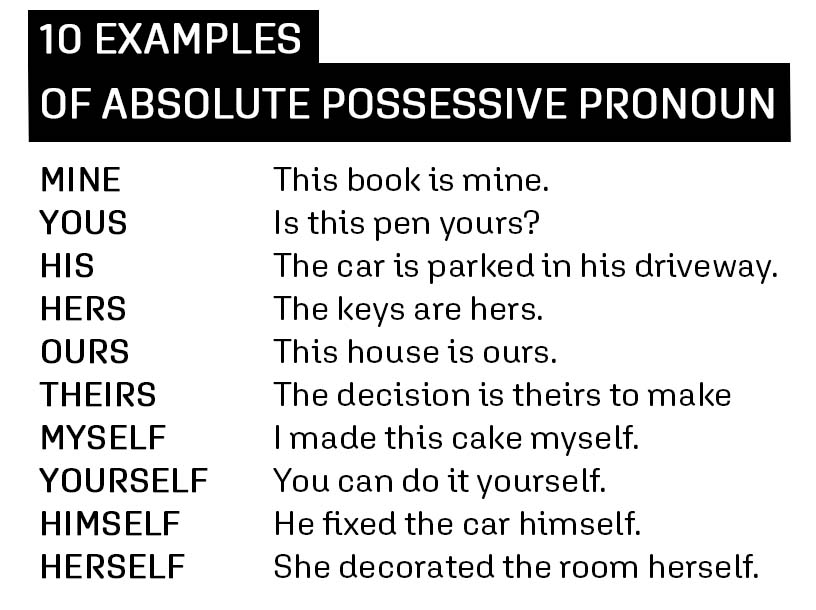Definition
Absolute possessive pronoun is often referred to as possessive pronoun, it is basically the terms “mine,” “yours,” “his,” “hers,” “ours,” and “theirs.”, so basically it is a word that replace a noun in a sentence.
10 examples of absolute possessive pronoun
- mine – “This book is mine.”
- Explanation: “Mine” shows possession. It means the book belongs to me. We use “mine” when we want to indicate that something belongs to oneself without mentioning the noun directly.
- yours – “Is this pen yours?”
- Explanation: “Yours” indicates possession by the person you are speaking to. It means the pen belongs to you. We use “yours” when we refer to something that belongs to someone else (the person we are addressing).
- his – “The car is parked in his driveway.”
- Explanation: “His” shows possession by a male person or an animal. It means the driveway belongs to him. We use “his” to indicate ownership or possession by a male subject.
- hers – “The keys are hers.”
- Explanation: “Hers” indicates possession by a female person or an animal. It means the keys belong to her. We use “hers” to show that something belongs to a female subject.
- ours – “This house is ours.”
- Explanation: “Ours” indicates possession by a group of people including the speaker. It means the house belongs to us. We use “ours” when we want to indicate ownership by a group that includes ourselves.
- theirs – “The decision is theirs to make.”
- Explanation: “Theirs” indicates possession by a group of people not including the speaker. It means the decision belongs to them. We use “theirs” when we refer to something belonging to another group of people.
- myself – “I made this cake myself.”
- Explanation: “Myself” is a reflexive pronoun used for emphasis or to indicate that the subject performed an action alone. It emphasizes that I, and no one else, made the cake.
- yourself – “You can do it yourself.”
- Explanation: “Yourself” is a reflexive pronoun used to emphasize that the person addressed can perform an action independently. It emphasizes that the person should do the action alone.
- himself – “He fixed the car himself.”
- Explanation: “Himself” is a reflexive pronoun used to indicate that the subject performed an action independently. It emphasizes that he did the action alone.
- herself – “She decorated the room herself.”
- Explanation: “Herself” is a reflexive pronoun used to emphasize that the subject performed an action independently. It emphasizes that she did the action alone.
Avoid Common Errors
Absolute possessive pronouns, such as ‘mine,’ ‘yours,’ ‘his,’ and ‘hers,’ can sometimes be confusing for beginners in English. A common mistake is using possessive adjectives (‘my,’ ‘your,’ ‘his,’ ‘her’) instead of these pronouns.
Remember, possessive adjectives describe nouns (‘my book,’ ‘your pen’), whereas absolute possessive pronouns stand alone to show ownership (‘the book is mine,’ ‘is this pen yours?’).
Another common error is misunderstanding reflexive pronouns like ‘myself,’ ‘yourself,’ etc., which are used when the subject and object are the same (‘I did it myself’). By practicing these distinctions, you can improve your English skills and avoid these common mistakes.

